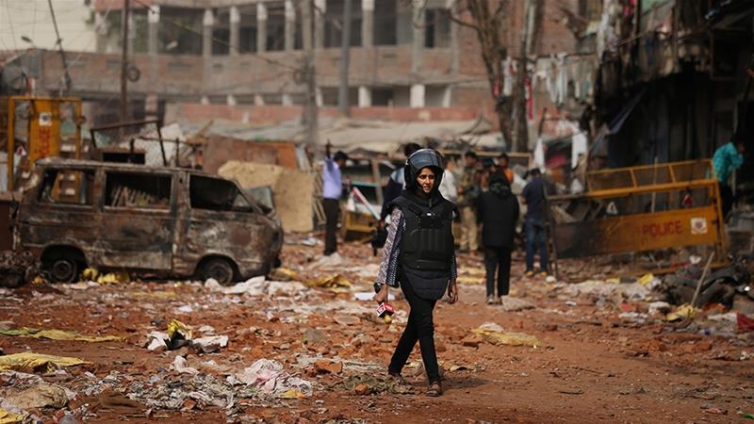Indian police have filed charges against 15 people over Hindu-Muslim riots in the capital, a spokesman said on Thursday, prompting criticism from rights groups that authorities were targeting the opposition and minority Muslims.
February's violence killed more than 50 people and drove thousands from their homes, most of them members of the Muslim minority, which forms about 15 percent of the country's roughly 1.3 billion population.
The riots followed months of protests against a new citizenship law that critics say discriminates against Muslims. The Citizenship Amendment Act (CAA), passed last December, fast-tracks nationality for minorities from three neighbouring countries but excludes Muslims.
The charges were filed in a court in eastern New Delhi, said police spokesman Anil Mittal, adding that the evidence against the accused runs to more than 17,000 pages.
Mittal did not identify those charged, but domestic media have named former members of two opposition parties and academics at one of the main protest sites, the Muslim-dominated university of Jamia Millia Islamia.
Arbitrary arrests
"By arbitrarily arresting outspoken activists, the government is not only attempting to silence dissent but also sending a message to supporters that they have free rein to commit abuses against minority communities," said Meenakshi Ganguly, South Asia director of New York-based Human Rights Watch.
Why is India’s citizenship law causing so much anger?| Start Here
Prashant Bhushan, a Supreme Court lawyer and vocal government critic, said the charge-sheet was "farcical".
Broadcaster NDTV called the investigation a "whitewash", adding that several members of the ruling Hindu nationalist Bharatiya Janata Party made incendiary speeches hours before February's riots but had escaped censure.
Amnesty International India in its report published last month accused Delhi police of "complicity and bias" in the February violence.
The government and Delhi police have defended their handling of the case, saying those involved in the riots will be punished regardless of political or religious ties.
This latest move follows the arrest of a former student leader who was arrested on Sunday for his alleged role in the February violence, a move denounced by activists as "a witch-hunt exercise".
Umar Khalid, 33, was arrested under the stringent Unlawful Activities (Prevention) Act (UAPA) in connection with the riots.
Legal experts have questioned the police's application of the UAPA on students and activists, as the law reduces the scope for bail, meaning jail terms without trial.
Latest Stories
-
Syria’s minorities seek security as country charts new future
41 minutes -
Prof. Nana Aba Appiah Amfo re-appointed as Vice-Chancellor of the University of Ghana
47 minutes -
German police probe market attack security and warnings
48 minutes -
Grief and anger in Magdeburg after Christmas market attack
49 minutes -
Baltasar Coin becomes first Ghanaian meme coin to hit DEX Screener at $100K market cap
2 hours -
EC blames re-collation of disputed results on widespread lawlessness by party supporters
2 hours -
Top 20 Ghanaian songs released in 2024
2 hours -
Beating Messi’s Inter Miami to MLS Cup feels amazing – Joseph Paintsil
2 hours -
NDC administration will reverse all ‘last-minute’ gov’t employee promotions – Asiedu Nketiah
3 hours -
Kudus sights ‘authority and kingship’ for elephant stool celebration
3 hours -
We’ll embrace cutting-edge technologies to address emerging healthcare needs – Prof. Antwi-Kusi
3 hours -
Nana Aba Anamoah, Cwesi Oteng special guests for Philip Nai and Friends’ charity event
3 hours -
Environmental protection officers receive training on how to tackle climate change
3 hours -
CLOGSAG vows to resist partisan appointments in Civil, Local Government Service
5 hours -
Peasant Farmers Association welcomes Mahama’s move to rename Agric Ministry
5 hours

